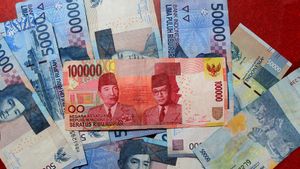JAKARTA - The mention of foreigners as “foreigners” has taken root in Indonesia. Those with physical physical characteristics of white skin, sharp noses, and blonde and white hair are identified as Caucasians. Moreover, if the person comes from Europe or America, their foreign status will complete.
Uniquely, in the field, this greeting actually reaps the pros and cons of those who are classified as the Caucasoid race. There are those who feel annoyed by the calls of foreigners, and some are comfortable being called foreigners. I was so comfortable that the term was thought to be a uniqueness that was only obtained when visiting the Land of the Emerald Equator.
We contacted a French citizen, David Joaquin, who often goes back and forth on vacation to Bali. He admitted that he objected to being called foreigners. He referred to the Big Indonesian Dictionary (KBBI). And he knew, in the dictionary, bule means as: a person who is white all over his body and hair because of lack of pigment; albino.
In addition, he also understands, the mention of foreigners is closely related to the albino buffalo. "Once or twice is funny. But, gradually, I felt uncomfortable. As far as I know, the term Caucasian means an albino white buffalo who is sick and I clearly disagree if someone calls me a foreigner, ”he said when contacted by VOI, June 14.
Unlike David. Keri, tourists from Switzerland who often flirt with Gili Trawangan, Lombok, West Nusa Tenggara (NTB) instead consider the mention of the word foreigner to Europeans or people who come from outside Indonesia as part of the uniqueness of Indonesia.
"So far, the call for foreigners is not a problem. I also don't feel uncomfortable about it, especially when I am greeted by Indonesians on the road, tourist attractions, or hotels. After all, Indonesians are known to be kind and friendly. So, as long as they are polite and respect me, then I will be happy to accept the call, "said the 32-year-old woman.
"For that, I am comfortable. In fact, sometimes it's funny to be called a foreigner. Because, in Europe we are not called foreigners. However, when we came to Indonesia we just felt called foreigners, "he added.
In the course of his journey, the term Caucasian did not only identify those who were white and were born in Europe and America. Those who come from Africa, Arabia, India, and Thailand can be classified as foreigners.
However, this term will not apply to those from Malaysia, Singapore and Brunei. The reason, of course, is because they are still classified as Malay people who are similar to Indonesians in general.
The origin of the word 'bule'Long before the word bule was popular, Indonesians generally generalized the mention of foreigners as a company or londo. The word 'Kompeni' itself comes from an Indonesian mistake in pronouncing the name of the Dutch trading company Vereenigde Oostindische Compagnie (VOC). Therefore, what is most remembered is the last line, namely 'compagnie', which over time the Indonesian tongue began to absorb the word into 'company'. Londo too, as long as their white skin is called londo.
For this reason, it is certain that the word bule did not exist throughout the Dutch colonial period, considering that many of the native people called foreigners or Europeans as Tuan. This call, like the Dutch colonialists in general, asked to be summoned.
Interestingly, a researcher named Benedict Anderson, in his short biography entitled Living Outside the Shell (2016), revealed that the term lord for those with white skin is somewhat uncomfortable in the ear. On that basis, he then replaced the term sir with a word that was rather comfortable to hear, namely 'foreigner'.
"Because of this, I have made a small (but durable) contribution in Indonesian. Seeing my skin color, which is not white, but pink and gray, I feel that this color is closer to that of albino animals (buffalo, cow, elephant, etc.) which Indonesians call "bulai" or "bule". So, I told my young friends to be called foreigners, not white. "

Then, it is said, Ben's friends liked the idea and passed it on. Automatically, newspapers and magazines began to write a lot about the identity of white foreigners as foreigners. Over time, the term has become part of everyday Indonesian.
Not only that, Ben also shared that more than ten years later, an Australian “white” colleague sent him a letter scolding him about how racist Indonesians call them foreigners. It's easy for Ben to answer. His friend was asked to look in the mirror to look at his own skin and ask himself, is it true that he wants to be called sir?
"I also told him that I popularized the new meaning for the term in 1962 or 1963. He didn't believe in me, so I said, 'You're a historian, an experienced Indonesian historian. "Bet 100 dollars, you won't be able to find the word bule in the meaning of white man, in any document before 1963. He wouldn't bet," Ben said musingly.
In line with Ben's joke, to get a clearer picture of the origins of Caucasians, we contacted the Lecturer of Anthropology Education, Department of Sociology and Anthropology, Faculty of Social Sciences, Makassar State University, Dimas Ario Sumilih. For him, Ben may claim to be the inventor of the term foreigner, but he insists that the truth is difficult to trace.
"If it's about this, maybe. However, as long as I understand it in Java, generally the older generation is more familiar with the term "landa" to refer to people who are later identified as "foreigners". The generation that was probably born after the 1960s, 1970s, most of the 1980s, even the current generation is more familiar with and familiar with the word 'bule' to refer to foreigners who have white skin, white to blonde hair, and eye color. blue, "said Dimas when contacted by VOI, Saturday, June 13.
Not surprisingly, Dimas emphasized, the emergence of the term "bule" should be suspected of being related to racial issues. In this case, what racial means is related to the conception of the human race, which has quickly become an important and main interest in anthropology student discussions.
"Therefore, in anthropological studies, discussions of races and their distribution throughout the world are the main interest for students in the field of physical / biological anthropology. Although later in the field of culture (cultural anthropology), in the end, they are also interested in the discussion of race, when this biological conception has an effect on perspective and then slowly it becomes a stereotype and more so as a lifestyle, "added Dimas.
In its development, said Caucasians, it did reap the pros and cons. One hand, foreigners think that the mention of foreigners is inclined towards ridicule or ridicule. The other side, especially the Indonesians themselves consider the word bule to have a prestigious value.
"So that the symptoms can be seen socially, it is not uncommon for us to be proud if we can meet or have foreign friends. There are even some of us who are obsessed with getting a girlfriend or more, having a serious relationship towards marriage by making their choice of life to foreigners, ”Dimas concluded.
The English, Chinese, Japanese, Arabic, and French versions are automatically generated by the AI. So there may still be inaccuracies in translating, please always see Indonesian as our main language. (system supported by DigitalSiber.id)











